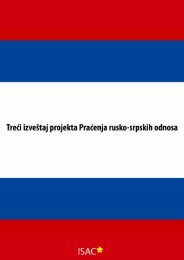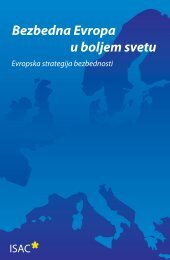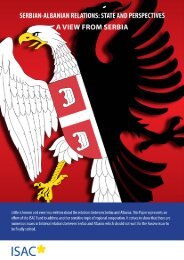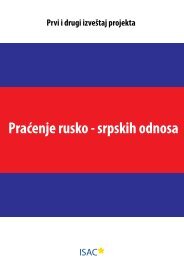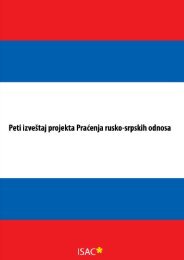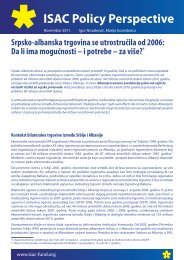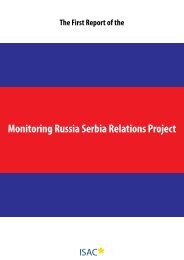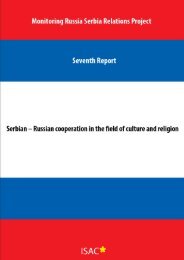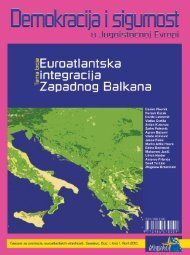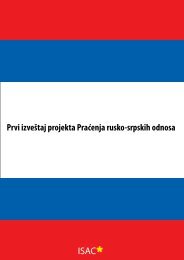MONITORING RUSSIA SERBIA RELATIONS - ISAC Fund
MONITORING RUSSIA SERBIA RELATIONS - ISAC Fund
MONITORING RUSSIA SERBIA RELATIONS - ISAC Fund
- No tags were found...
You also want an ePaper? Increase the reach of your titles
YUMPU automatically turns print PDFs into web optimized ePapers that Google loves.
laid itself, i.e. its own empire, as a sacrifice to "protect" Serbia in 1914 17 , or of Russia that"betrayed" Serbia in 1878 having concluded the Treaty of San Stefano, thereby creating aGreater Bulgaria 18 . Russia is thus converted into a symbol with a functional valueexclusively in the Serbian political speech and ideological battles.A big problem, when speaking of the repression of the rational and the domination of theemotional, based on stereotypes and myths, envisaging of Serbian-Russian relations, is thefact that emphasis on an irrational discourse (love vs. hate Russia) imposes on the Serbianpublic (and very often on the Serbian politics, for that matter) a totally artificial choice, inthe form of an imperative dilemma/decision: either Europe or Russia, or, at the metaphysicallevel, a decision between the East and the West. 19 That enhances the already overemphasizedproclivities in the Serbian politics and public for a constant imposition ofmaking imperative political decisions, for a constant classification of the Serbian society,public persons and politicians into "ours" and "theirs". Such divisions in a small andundeveloped society and in a country such as Serbia represent a big burden and prevent arational foreign policy from being profiled.The extent of the emotional perception of Serbian-Russian relations can also be proved bythe fact that in Serbia, a large number of scientists and publicists regard as necessary andopportune to voice their opinion in public and analyze Serbian-Russian relations, modernRussian politics or politicians. It is hard to count the total number of texts published in thepress and on the Internet. The fact that in the past 10 years at least 30 books on modernRussia have been published is enough to testify to the extent of this production 20 . (Thenumber of books by Serbian authors on the USA and other countries in the West publishedin the same period is much less.) In most cases, at issue are works with a hypothesis set inadvance (mainly the glorification of Putin and Russia), which can be seen from the verytitles: Vladimir Putin and the Resurrection of Russia (2001),Rise of Russia (2002), The Westor Russia (2004), A new course of Russia (2005).17 Highlight of the week: Russia's Awakening, Sava Zivanov, Politika online, 18 February 2007(http://www.politika.rs/rubrike/Tema-nedelje/Budjenje-Rusije/t20106.sr.html)18 Cf. Dubravka Stojanovic, The Serbs and the Russians, Blic online, 15 January 2009(http://www.blic.rs/temadana.php?id=74306)19 Regardless of dilemmas in the remote or distant past regarding taking the "Eastern" or the "Western" passage(Borislav Pekic) and fears of and resistance to "Westernization", it was orientation towards the EuropeanWest (and not towards the East) that brought progress and modernization in all fields.(Ljiljana J. Bacevic, The Serbs and Europe, Belgrade, 2001, 7)20 B. Gvozdenovic, Russia, a Land above the Earth: Remembrance: As It Had Been Yesterday, Belgrade 2002,V. Djuric Vladimir Putin and the Resurrection of Russia, Belgrade 2001, V. Djuric Vladimir Putin and theResurrection of Russia, Part 2, In the Midst of the Journey, Belgrade 2004,V. Djuric, Putinism: History, Theory, Practice, Belgrade 2008, Lj. Milincic, Vladimir Putin: My Battle forKosovo, Belgrade 2007, D. Milicevic, Stories from Russia, Belgrade, 2002, Dj. Milosevic, Time of Shame andCrime, Novi Sad 2005, Dj. Milosevic, Russia on the Crossroads, Novi Sad 2003, P. Rak, NationalistInternational, Belgrade 2002, J. Salevic, Little Russian Stories, Belgrade 2004, A. Uzelac: Putin's Children,Belgrade 2005, J. Kurjak, O. Popovic-Obradovic, M. Sukovic, Russia, Serbia, Montenegro, Belgrade 2004, J.Kurjak, Political Changes in Russia 1990-1996, Belgrade 2000, Z. Milosevic, The Russian Question Today,Belgrade 2006, D. Mirovic, The West or Russia, Belgrade 2004, The Russian Policy in The Balkans:Collection of Works (edited by Jelica Kurjak), Belgrade 1999, V. Veres, Serbia and Russia – Reality andIllusions, Belgrade, 2000, S. Zivanov, Russia at the Time of Yeltsin – Social Processes and PoliticalOrganization (1990-1999), Belgrade 2002, S. Zivanov, Russia at the Turn of the Centuries – the Last Decadeof the Russian Empire, from the End of the Crimean and to the Beginning of the First World War (1855-1914),Belgrade 2002, S. Zivanov, The Fall of the Russian Empire1-2, Belgrade 2007, S. Zivanov, Russia and theEuropean Schism: Relations among European Powers on the Eve of the First World War: from the BerlinCongress to the Beginning of the War (1878-1914), Belgrade 2005, N.B. Popovic, Serbia and the ImperialRussia, Belgrade 2007, D. Petrovic: Geopolitics of the Post-Soviet Regions, Belgrade, Novi Sad, 2008, D.Petrovic, Russia at the Beginning of the 21st Century – a Geopolitical Analysis, Novi Sad, Belgrade, 2007, D.Petrovic, Demographic Marks of Modern Russia, Belgrade 2007, etc.46



